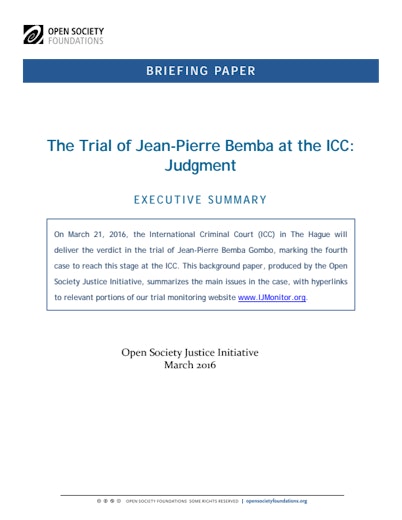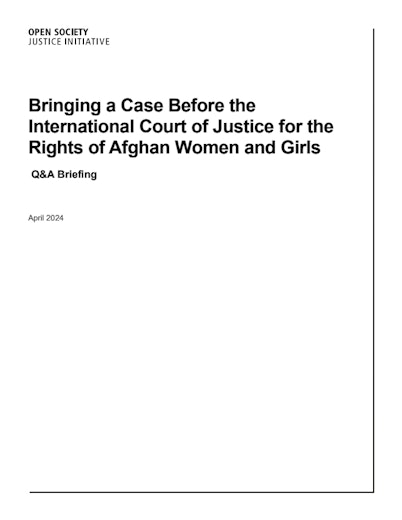Gaza Inquiry
The Duty to Investigate and Prosecute War Crimes
The Gaza conflict of December 2008 led to allegations of violations of the law of war against both Israel and the Palestinian Authority. The official UN report into the conflict (the “Goldstone Report”) criticized both sides for failing to conduct adequate investigations into these allegations. The Israeli Defence Forces (IDF) rejected these criticisms, arguing that their system of unit-led investigations is the same as that used in other democracies. The UN Human Rights Council has appointed a follow-up Committee of Experts to monitor the independence, effectiveness, and genuineness of the investigations and their conformity with international standards.
Facts
In September 2009, the Goldstone Report of the Fact-Finding Mission on the Gaza Conflict made a number of conclusions concerning the independence and impartiality of the military investigations that were undertaken or underway by the Military Advocate General’s Corps of the Israeli Defence Forces. The report found that the use of “operational debriefings” to investigate allegations of war crimes, whereby the unit involved in the incident undertakes a preliminary investigation into whether or not a crime has been committed, did not satisfy the duty to investigate violations of international humanitarian law and human rights law.
The Goldstone Report concluded that this system resulted in delays of up to six months to transfer cases to an independent criminal investigation, and suggested that the narrow definition of per se criminal conduct meant that very few cases had been transferred.
In January 2010, the IDF issued a report in response, which argued that other military justice systems operated in the same way, specifically citing the US, UK, Canada, and Australia, and claiming that Israel's system did not violate international standards. The IDF Report maintains that it is necessary to conduct an immediate independent criminal investigation only where there is an allegation of per se criminal behavior, which includes the ill-treatment of detainees, the use of civilians as human shields, looting, and the intentional killing of a civilian. In cases of negligent or reckless killings, or of any other type of conduct that may amount to either a violation of law of armed conflict or a serious violation of human rights law, it is for the unit concerned in the incident to conduct its own “Command Investigation,” at the conclusion of which the unit must submit a report to the commanding officers and to the Military Advocate General who will then consider whether an independent criminal investigation is required. The IDF report states that any initial complaint will also be screened by the Military Advocate General who also has the power to refer an investigation to the Military Police Criminal Investigation Division (MPCID) prior to the conclusion of a command investigation.
In February 2010, the UN General Assembly requested a report on the steps that had been taken to investigate allegations of violations of international humanitarian law by both Israel and the Palestinian Authority. In March 2010, the UN Human Rights Council established a committee of experts, to be chosen by the High Commissioner for Human Rights, “...to monitor and assess any domestic, legal or other proceedings undertaken by both the Government of Israel and the Palestinian side...”
On June 14, 2010, the UN High Commissioner for Human Rights announced the appointment of three independent experts to the committee: Christian Tomuschat of Germany (Chair), Mary McGowan Davis of the U.S., and Param Cumaraswamy of Malaysia.
Open Society Justice Initiative Involvement
The Justice Initiative was asked by the organization Adalah to prepare a memorandum for the UN Human Rights Council’s follow-up Fact-Finding Committee. The Justice Initiative’s memo analyzes the IDF’s investigation into the 2008–2009 Gaza conflict and provides a comparative review of the legal standards in the US, UK, Canada, and Australia pertaining to the investigation and prosecution of alleged violations of the law of war.
Arguments
The memorandum outlined the following legal points with regard to the duty to investigate and prosecute allegations of violations of the law of armed conflict:
Applicable law. The duty to investigate and prosecute violations of the law of armed conflict arises from international humanitarian law, human rights law and customary international law, and applies during an armed conflict.
Applicable standards. Any investigation must be independent and impartial, prompt and expeditious, effective and thorough, must involve an autopsy or other medical evidence, and must be capable of leading to the identification and punishment of the perpetrators.
With regard to the conduct of investigations in the four comparative systems, the memorandum drew the following conclusions:
Reportable Incidents. The IDF distinguishes between a narrow class of per se criminal incidents which are subject to immediate reporting and other violations of the law of armed conflict which are only considered for criminal investigation at the conclusion of a command investigation. In the other four countries compared, virtually any incident that results in death or injury of civilians must be immediately reported and considered for an independent investigation.
Prompt. Under the system operated by the IDF it can take six months or even a year for a command investigation to be completed and a criminal investigation to be commenced. By contrast, in other systems such investigations are commenced immediately, or within a matter of days.
Effective. The IDF utilizes command investigations to gather evidence, tainting it for any subsequent inquiry. In the countries compared, independent investigative units have special powers for such investigations.
Independent. The IDF is heavily reliant upon the unit involved in the incident to conduct investigations. In the four countries compared, the investigation is promptly removed to a hierarchically independent unit.
On September 23, 2010, the Committee of Experts submitted their report to the UN Human Rights Council (A/HRC/15/50). The Committee assessed the investigations for compliance with international standards of independence, impartiality, effectiveness, thoroughness and promptness.
The report set out the international humanitarian law and international human rights law standards applicable to investigations in some detail. The report then reviewed the military investigations undertaken by Israel and the Palestinian side, highlighting a number of concerns.
While there were mechanisms in place within the Israeli legal order to investigate allegations of war crimes, the Committee concluded that the actual operation of Israel’s military investigations system raised concerns. The Committee considered that the dual role of the Military Advocate General - to provide legal advice to the IDF on the planning of military operations, as well as to conduct all prosecutions of alleged misconduct by IDF soldiers during the operations in Gaza—raised a conflict of interest and undermined impartiality, given the Fact-Finding Mission’s allegation that those who designed, planned, ordered and oversaw the operation were complicit in rights violations. Transparency in reporting progress and results of investigations and access to justice for victims were requirements for investigations under human rights law that Israel also contravened.
The Palestinian Authority established an independent commission of investigation, which carried out a careful and detailed inquiry. The Committee concluded that the investigation undertaken by the commission, which alleged that serious violations of international human rights law were committed by public officials in the West Bank, conformed with international standards. With respect to the two committees of inquiry established by the de facto authorities in Gaza, the Committee could not conclude that credible and genuine investigations had been undertaken.
In its follow-up to the report of the United Nations Fact-Finding Mission on the Gaza Conflict, dated March 25, 2011, the Human Rights Council took note of the Committee’s report and called for the implementation of its conclusions. The Human Rights Council “regrets the non-cooperation by the occupying power, Israel, with the members of the committee of independent experts, and its failure to comply with the calls of the Human Rights Council and the General Assembly to conduct investigations that are independent, credible and in conformity with international standards into the serious violations of international humanitarian and international human rights law reported by the Fact-Finding Mission, and calls on all the parties to the conflict including the Palestinian side, to take into account the conclusions of the committee.”
The Committee submitted its second report.
The Committee of Experts submitted its first report to the UN Human Rights Council.
Follow-up Committee of Experts is appointed.
Human Rights Council resolution A/HRC/RES/13/9 calling on Israel and the Palestinian Authority to conduct investigations to international standards.
Publication of response by the IDF.
General Assembly Resolution A/RES/64/10 calling for independent investigations by both Israel and the Palestinian Authority.
Publication of the Goldstone Report.
Human Rights Council establishes the Fact Finding Mission chaired by Justice Richard Goldstone.
Conclusion of the Gaza conflict.
Conflict in Gaza commences.
Related Cases
Related Work
The Trial of Jean-Pierre Bemba at the ICC
This briefing paper reviews the legal issues in the trial of Jean-Pierre Bemba at the ICC, including arguments put forward by the prosecution and defense.

Gaza Crisis, Revisited
Israeli investigations into alleged violations during the 2008 Gaza Conflict have not complied with international or comparative standards, according to an Open Society Justice Initiative analysis.
Q&A: Bringing a Case Before the International Court of Justice for the Rights of Afghan Women and Girls
This paper considers 21 questions around the feasibility of bringing a complaint at the International Court of Justice against Afghanistan's Taliban for egregious and prevalent violations of women’s and girls’ rights.
